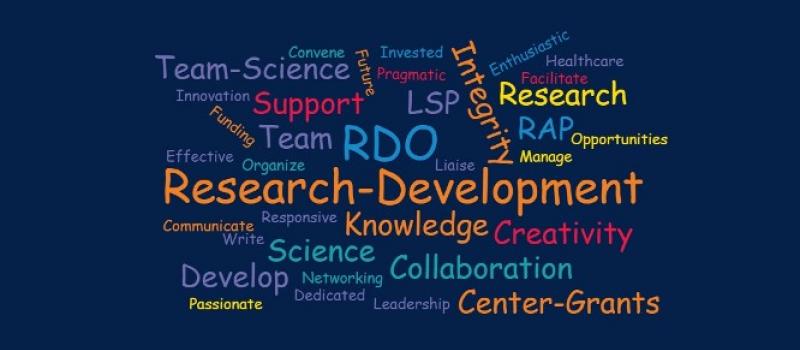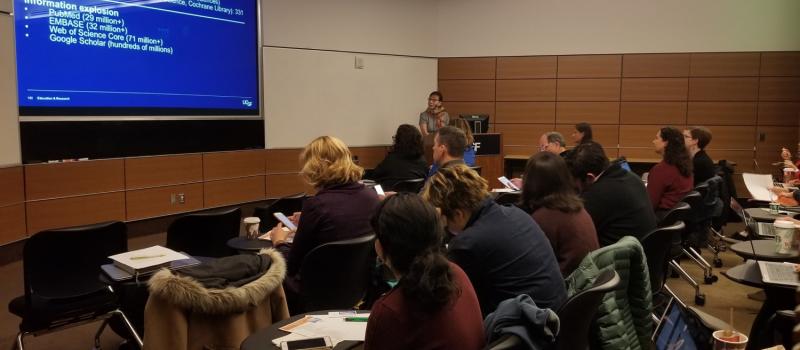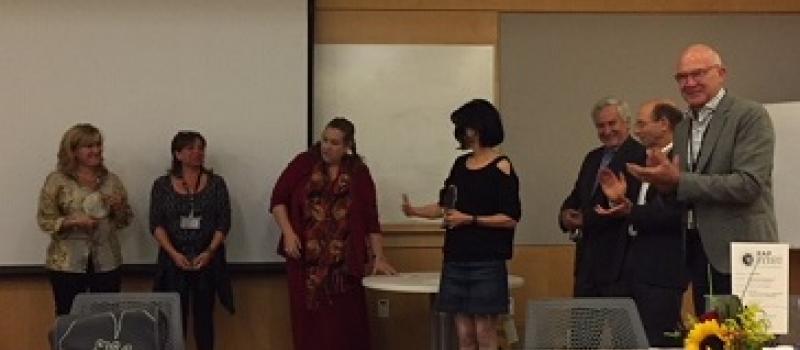Menu
What is the RDO?
In The Know
What is Research Development?
RDO Programs
RD In Action
Breaking News
The UCSF Office of Research under VCR Collard is closely following the dynamic activity of the federal government and the impact to the research at UCSF. Please find an up-to-date guidance on federal agency directives at https://research.ucsf.edu/impacts-2025-federal-executive-orders-and-directives.
The UC system’s 10 campuses form one university, and we are working together with the UC Office of the President (UCOP) to monitor developments in the changing policy landscape. As part of this effort, UCOP has developed a webpage external site (opens in a new window) that will post updates on a range of issues that are important to the work of UC and UCSF.
If you have additional questions, please feel free to contact us [email protected].
The Limited Submission Program will now be managed using the InfoReady tool.
Finding Alternative Funding to NIH Presentation Series - May to September 2025
The Research Development Office (RDO) is excited to share an early announcement that we have secured funding for a 2025 cycle of research funding for the Marcus Program in Precision Medicine Innovation. Here is the link to the 2025 MPPMI RFA. The submission deadline will be July 15, 2025.
The Spring 2025 RAP funding cycle is near completion: funding decisions will be announced by May 29, 2025. Details and further information at RAP.
What is the RDO?
Mission: The RDO works collaboratively with individual faculty members, teams of researchers, and institutional administrators and leaders to promote, support, strengthen, and grow the research enterprise at UCSF.
Values: The RDO values the individual knowledge, skills, talents, and experience of every person across the research network. We strive for excellence in our work, conducting ourselves ethically with professionalism, integrity, and with mutual-respect for all.
Goals: The RDO accomplishes our mission to promote the research enterprise at UCSF by developing and implementing strategies that increase institutional competitiveness and attract research funding, and by fostering innovative approaches and novel partnerships.
We do this through 5 programs:
The Resource Allocation Program (RAP), which manages the dissemination, submission, review and award of various intramural funding opportunities, and the Limited Submission Program (LSP), which manages the dissemination, solicitation and selection of proposals for limited submission funding opportunities. Additionally, the RDO fosters and facilitates scientific collaborations between internal and external research teams through its Team Science Program (TSP) and Special Strategic Projects (SSP). The RDO also supports proposal development for large, multi-investigator project grants in its Large Grant Development Program (LGDP). As a service- and solutions-oriented team, the RDO operates with integrity, professionalism, and respect for those with whom we work within and outside of UCSF.
In The Know
The Marcus Program in Precision Medicine Innovation is pleased to announce the results of the 2024 cycle for innovative collaborative project proposals for the following grant mechanisms: Transformative Integrated Research (TIR), Seeding Bold Ideas (SBI), Ethical-Legal-Social Implications (ELSI) in Precision Medicine and Inclusion-Diversity-Equity-Anti-Racism (IDEA) in Precision Medicine. We received a total of 46 excellent and potentially transformative trans-disciplinary research proposals from faculty across UCSF. We awarded over $2 million funding 14 bold research projects across the four different Marcus mechanisms. Please see a list of all awardees here.
Highlights of past networking events, including some of those for the Marcus Program can be found here.
The current Marcus Program 2024 award cycle RFA can be found here. The program overview is here.
NIH Simplified Review Framework: An Informational Townhall
Did you know NIH will be changing to a Simplified Review Framework for Research Project Grants submitted after January 2025? An informational session to discuss the forthcoming changes and the implications of those changes for UCSF investigators was held on Wednesday, September 25, 2024. For those who missed the presentation you can find the slide deck and the recording here. 'All About Grants' NIH podcast episode focused on the Simplified Review Framework here. Highlighted FAQ's here.
Enhancing Your NIH Biosketch with Metrics Using Dimensions
In case you missed the session on how to enhance your NIH Biosketch with metrics using the Dimension platform here are the presentation and recording from the October 15, 2024 session.
Junior Scientists Seminar Series
The Research Development Office (RDO) proudly supports and sponsors the Junior Scientists Seminar Series. This program, created and led by a team of Senior Scientists Rachel Abrams, PhD and Henriette Macmillan, PhD, is a means for early-career researchers (pre-doctoral) to participate in valuable career development activities. Through this series, they engage in peer-networking, as well as gain experience orally presenting their research and developing skills to answer and ask meaningful questions. For many in the research career pipeline, the Junior Scientist role is one of the first steps, and this valuable program is helping to develop this pipeline of truly diverse scientists here at UCSF. Please see the Junior Scientist website for more information.
Advanced Research Projects Agency for Health (ARPA-H)
A new federal funding agency - the Advanced Research Projects Agency for Health (ARPA-H) – was created to speed medical breakthroughs to patients who urgently need them. ARPA-H is focused on a bold mission to advance high-potential, high-impact biomedical and health research that cannot be readily accomplished through traditional research or commercial activity. ARPA-H will make big bets to build high-payoff capabilities or platforms to drive biomedical breakthroughs – ranging from molecular to societal – that will provide transformative solutions for all individuals. ARPA-H will be looking for projects that are transformational, driving biomedical breakthroughs. They will not support incremental research efforts. They seek to support "Imagine if..." projects.
Please find details on this new funding agency, funding opportunities, and networking opportunities here.
RDO Anti-Discrimination and Inclusion Activities
UCSF Task Force on Equity and Anti-Discrimination in Research
Toward Algorithmic Justice in Precision Medicine Workshop (Program Agenda) (Event Videos) (Full Report)
IDEA-Related Funding Opportunity Highlights
Institutional Funding Programs
The UC Noyce Initiative is a partnership between five University of California campuses (Berkeley, Davis, Irvine, San Francisco, and Santa Barbara) that honors the legacy of Ann S. Bowers and Robert N. Noyce by advancing computing, information science, and engineering for the benefit of society. To further this aim, the UC Noyce Initiative intends to support research efforts that are innovative, have the potential for high impact, and hold a strong promise for follow-on funding. The UC Noyce Initiative is particularly interested in supporting high-risk, high-reward research that typically does not qualify for traditional or federal funding agencies.
UC Executive Leadership Team: UC Berkeley – Kathy Yelick; UC Davis – Prasand Mohapatra; UC-Irvine – Pramod Khargonekar; UC Santa Barbara - Pierre Wiltzius; UC San Francisco – VCR Hal Collard
UCSF Administrative Director: Gretchen Kiser ([email protected])
Cross-UC Research Grants
We anticipate a research funding call in the first quarter of 2024.
In 2023, the UC Noyce Initiative collaboratively solicited and awarded proposals in two formats - $1 million, 2-year Multi-Campus Partnership Awards and $300,000, 2-year Single Campus Awards - focused on two thematic areas: (1) Computational Health; (2) Privacy and Security.
Check out the detailed RFA here and an associated FAQ document, as well as the link to the June 27, 2023 informational webinar. Use the following link for a list of recent awarded projects.
Please see details of previous funding cycles here.
The Marcus Program in Precision Medicine Innovation (MPPMI)
The Marcus Program in Precision Medicine Innovation (MPPMI) seeks to fuel innovation in precision medicine by fostering creative, high risk, high impact team science projects anchored in basic science and extending into the precision medicine continuum toward improved patient outcomes. Currently, the Program awards projects through four grant mechanisms: seed funding through Seeding Bold Ideas, and larger research grants through the Transformative Integrated Research, ELSI in Precision Medicine, and IDEA in Precision Medicine awards.
George and Judy Marcus have generously provided funding since 2016 to drive innovative and collaborative efforts between the truly multi-disciplinary array of researchers – from ‘basic’ researchers to clinical or social/behavioral/population scientists to computational scientists, that are all essential to making precision medicine a reality. Precision medicine aims to harness vast amounts of biological and biomedical data– from basic molecular research to clinical, environmental, socioeconomic and mobile lifestyle data – and use it to define biological processes and disease mechanisms, to understand why different individuals respond differently to treatments, and to help guide more precise, predictive and preventative medicine. The MPPMI advances precision medicine at UCSF through networking events that actively motivate and foster collaborations, and through direct funding of innovative research projects.
Check out this article about the impact of the Marcus Program: Marcus Awards Funds Bold Ideas, Transformative Collaborations, and Innovative Social Research.
Past award recipients are listed here: 2017 - 2018 - 2019 - 2020 – 2022 Marcus awards.
The current Marcus Program 2024 award cycle RFA can be found here.
Pilot Grants for Anti-Racism Research 2022 Awardees Announced
NOTE: Due to current staffing levels in the RDO, certain services may be limited.
What is Research Development?
Universities, colleges, research centers, and institutes are central players in the networks of coordinated activity that result in the creation and mobilization of knowledge. As these activities have reached ever higher levels of complexity, research development has taken on an increasingly important role in the strategic deployment and coordination of university and other networked resources in the service of knowledge creation and mobilization. The Research Development (RD) professional works to ensure that when institutional resources are deployed to seek external funding or partnerships for knowledge creation or mobilization, that these activities are as strategic and efficient as possible so as to maximize the likelihood that the best ideas with the best chances for ultimate success are recognized and supported with the finite support available.
(Adapted from content on the website for the National Organization of Research Development Professionals (NORDP))
Further information: "Research Development as a Strategic Imperative" by Christina Paxson, President, Brown University, 4/29/19
RDO Programs
Resource Allocation Program (RAP)
RAP is a campus-wide program that manages the dissemination, submission, review and award of various intramural funding opportunities. The seed-funding grants are offered twice per year: in the Spring (online application submission begins in January) and in the Fall (online application submission begins in August) . Click here for more information.
Limited Submissions Program (LSP)
The LSP is responsible for the management of extramural funding opportunities that limit the number of applications UCSF may put forward to a given sponsor or require some other kind of internal coordination (e.g., to eliminate unnecessary duplication of instrument requests).
Large Grants Development Program
A "large grant" is one for which the allowable budget exceeds $1M per year in direct costs or the research involves multiple investigators and scientific/administrative components. LGDP staff support every step of the proposal process for large grants, including early-stage scientific discussions, timeline development, the collection and writing of common institutional language, late-stage technical editing, and proofreading.
Special Strategic Projects (SSPs)
SSPs involve facilitating cross-institutional research collaborations or donor proposal development, as well as supporting campus-wide initiatives such as our Precision Medicine Initiative. This program also includes outreach activities with other research development and research administration partners within UCSF, UC and across the nation.
Team Science Program (TSP)
The TSP fosters and supports team science efforts across campus and between our campus and other partners. The program offers a variety of services aimed at stimulating multi-investigator, multi-disciplinary efforts, from producing team-building events to supporting administrative needs of new teams.
T32 Trainee Tracking Program
The Trainee Tracking Program has been closed effective January 1, 2022.
Office of Research has provided updated guidance for T32 proposals, with assistance from several T32 program coordinators and faculty. Click here for more information on the T32 Program Administrators Group.
As you may know, NIH NOT-OD-19-108 requires the use of xTRACT to prepare data tables for Training Grant RPPRs. Data previously entered into the 3TS database is the same data required by xTRACT. xTRACT will generate tables once data entry is completed. Therefore, the 3TS program was closed and we are no longer entering data into the 3TS database. Access may be granted to view/download historical data in 3TS, if necessary. There are some remaining resources for preparation of T32 applications and can be found at Guides.
RD In Action
Research Development: Contextual and Relational Approaches to Institutional Research Support (INORMS NORDP India Research Management Initiative)




